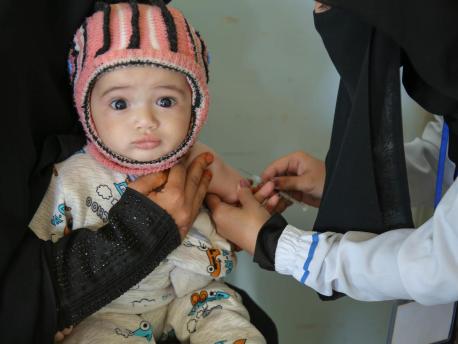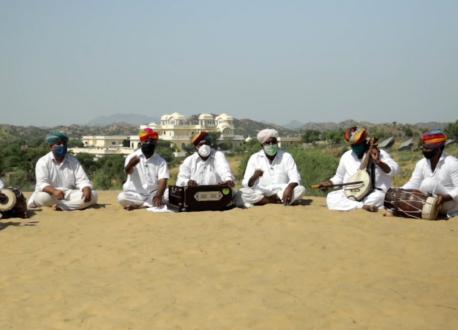
A Massive Vaccination Campaign Is Saving Lives in War-torn Yemen
While the U.S. reels from a resurgence of measles, communities in Yemen are mobilizing to immunize and protect their children from infectious diseases.
UNICEF and partners are working tirelessly all over the world to save and protect children.
As of March 14, 314 cases of measles have been reported this year in the United States, according to the Center for Disease Control and Prevention. That's just 58 less than the number of cases reported in the U.S. in all of 2018.
Measles — a highly contagious, potentially deadly disease — was declared eliminated in the U.S. in 2000, thanks to an effective vaccination program. Public health experts say complacency and the antivaxxer movement are to blame for the current alarming increase. The World Health Organization (WHO) named "vaccine hesitancy" — the reluctance or refusal to vaccinate despite the availability of vaccines — as one of the top ten threats to global health in 2019.
Immunizations prevent an estimated 2 to 3 million deaths every year
The more unimmunized children there are today, the greater the likelihood of severe disease outbreaks in the years to come. That's why, even as Yemen's civil war drags into its fourth year, health care professionals there are working valiantly to ensure that children across the nation are vaccinated. In 2019, local authorities with support from UNICEF, WHO and Gavi, the Vaccine Alliance, launched a massive countrywide immunization campaign, vaccinating 11.6 million children (90 percent) between the ages of 6 months and 16 years.
UNICEF USA's Justin Hemenway spoke with UNICEF Immunization Specialist Dr. Bilal Ahmed to learn more about how a country in the middle of a devastating civil war is successfully vaccinating children against measles and other potentially life-threatening infectious diseases.
The ink on this girl's finger means that she's received her vaccinations! She's one of 9 million children throughout #Yemen who are now protected against Measles and Rubella thanks to a @UNICEF_Yemen-supported, nationwide immunization campaign. #VaccinesWorkpic.twitter.com/CLZHWPxUuJ
— UNICEF USA (@UNICEFUSA) February 17, 2019
What does it take to coordinate a vaccination drive of this scale, with 40,000 vaccinators on the ground?
BILAL AHMED Since the war started in March 2015, we have been doing regular risk assessments [for possible outbreaks] and identifying high-risk districts and doing regular ad response campaigns. In early 2018, we felt we needed to do a nationwide campaign to address the issues of suspected cases which were being reported in different governates.
What has the war meant for vaccination rates in the country?
BILAL AHMED Yemen has still maintained its polio-free status, despite having war in the country. If you look at Syria or Somalia or some other countries, they have outbreaks. But in Yemen, we haven't had any outbreaks of polio since the war started, so it reflects that we have very good coverage. We have successfully maintained routine vaccination coverage above 80 percent.
The districts and governates where we have problems are our top priority. We have a specific strategy to reach the children and women with vaccination services. For example, we have challenges reaching the children in Sa'ada. We conducted our vaccination campaign there, and we continued our strategy by reaching out to influential community members and religious leaders and using different alternative measures to ensure that every child is vaccinated.
In December 2018, we also connected the measles campaign and the polio campaign. We have a strategy to maintain high coverage with a focus on districts that are inaccessible and where there are security problems.
Vaccinators in #Yemen need strong legs!
— UNICEF USA (@UNICEFUSA) February 21, 2019
With @UNICEF_Yemen support, they walk on rocky paths several hours a day to give a chance to children living in remote areas to get vaccinated and be protected from preventable diseases. #heroes#VaccinesWorkpic.twitter.com/jq4ES1YWva
What are some of the conditions vaccinators face in remote areas, where they're reaching the most vulnerable?
BILAL AHMED Workers are climbing mountains, they are fording rivers. There are always many challenges, and this war has added challenges to the service deliveries. We always involve the local team in the service deliveries. We have three strategies: The Fixed Strategy, where the population comes to get vaccinated. The Outreach Strategy, in which teams go to different areas to provide services. And the Mobile Strategy. We have deployed more than 160 mobile teams across the country and they are providing services specifically in those areas where the health facilities are damaged or destroyed.
The motivational level of our workers is very high. They are putting all their efforts into reaching the children, even those who are living in war zones or on top of mountains.
The motivational level of our workers is very high. They are putting all their efforts into reaching the children, even those who are living in war zones or on top of mountains or on border areas between countries.
How are the vaccines delivered to the workers in these remote areas?
BILAL AHMED UNICEF has a major role in keeping the supply chain intact. We bring the vaccines into the country and we make sure the vaccines reach every child. Sometimes the terrain is rough and we can't use conventional transportation like cars or trucks or motorcycles. Instead, we are using donkeys and camels to take those vaccines to the children.
#KidsHelpingKids: In Hadramaut, #Yemen, 14-year-old Abdullah spreads information about immunization in hard-to-reach areas while riding his donkey.
— UNICEF USA (@UNICEFUSA) February 15, 2019
Thanks in part to him, 300 children in his community have received vaccines so far this month. #VaccinesWorkpic.twitter.com/1LmKn6cMaR
How do you get the word out that immunization is important?
BILAL AHMED You have to talk to the local people, to the communities, and you have to involve them in the communication and dissemination of the messages. We believe, because Yemen is a tribal system, sometimes when you send workers from other areas, people from the community will not accept their ideas. But when you involve the local people, the local influencers and the local leaders, the people listen more to them. This is one of our successful communication strategies. I think there are many children, like that boy on the donkey, who are working with us. They are the helping hands of UNICEF, helping to take the message to every corner of Yemen.
It's great to see the community getting involved like that, and kids getting involved too. Are there any misconceptions about vaccines in Yemen?
BILAL AHMED Yes, definitely. Like many other countries in the region, there are misconceptions. There is resistance to vaccination services. And this war has added challenges to that. We are working on that. UNICEF helped the Ministry of Public Health develop the first ever communication strategy in Yemen. Previously, there was more focus on mass media and mass communication. But now we have successfully involved the community, the health workers and local influencers, and we are focusing more on interpersonal communications.
We also provide nutrition screenings, counseling, medications — a package of services. And because we provide all these services, the acceptance of vaccination has very much increased.
When we go to the communities, we have focus groups. Some of the people say, "You always come with vaccinations. You don't provide any other services," so we are giving them integrated services. We don't provide only vaccinations. We also provide nutrition screenings, counseling, medications — a package of services. And because we provide all these services, the acceptance of vaccination has very much increased.
What does it mean to families in Yemen to be able to vaccinate their children?
BILAL AHMED It means a lot to them. Even in Hodeidah, where the war is really bad, we reached more than 87 percent of the children. The parents value vaccinations. Even in a war zone. They know that if their child is not vaccinated, the child may be sick or might even die.
Top photo: A child is vaccinated at a health center in Bani Alhareth, Sana'a, Yemen during a UNICEF-backed measles and rubella vaccination campaign. © UNICEF/UN0284441/ Alaidroos
HOW TO HELP
There are many ways to make a difference
War, famine, poverty, natural disasters — threats to the world's children keep coming. But UNICEF won't stop working to keep children healthy and safe.
UNICEF works in over 190 countries and territories — more places than any other children's organization. UNICEF has the world's largest humanitarian warehouse and, when disaster strikes, can get supplies almost anywhere within 72 hours. Constantly innovating, always advocating for a better world for children, UNICEF works to ensure that every child can grow up healthy, educated, protected and respected.
Would you like to help give all children the opportunity to reach their full potential? There are many ways to get involved.



